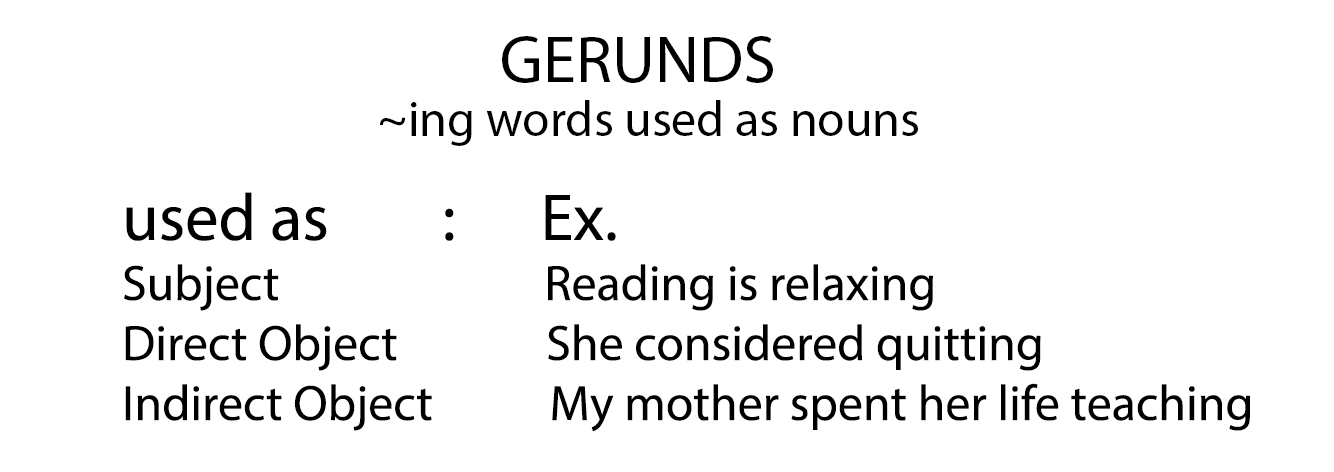Gerunds
What is a gerund?
A gerund is the “-ing” form of a verb when it functions grammatically as a noun in a sentence. Gerunds are identical in appearance to present participles, but they are not used to form tenses of the verb or provide adjectival information.
Gerunds can either stand alone, or they can take a noun (the object of the gerund) and/or modifier(s) to form a gerund phrase.
Functions in a sentence
Because they act like nouns, gerunds can be used as the subject of a sentence, the subject complement of the linking verb be, the object of a preposition, or the object of a verb. They can also be used to form compound nouns.
As the subject
Just like a normal noun, a gerund or gerund phrase can be the subject of a sentence. For example:
- “Swimming is an excellent form of exercise!” (gerund only)
- “Eating vegetables gives you a lot of extra energy.” (gerund + object)
- “Studying too hastily will result in a poor grade.” (gerund + adverb(s))
- “Reading romantic literature proves to be an unpopular pastime among academics.” (gerund + adjective + noun)
- “Working from home allows me to spend more time with my family.” (gerund + prepositional phrase)
Adverbs modifying gerunds
Notice that in our third example, the gerund studying is being modified by an adverb, hastily (itself modified by too). Likewise, working in the last example is modified by the adverbial prepositional phrase from home.
This may seem contradictory, since gerunds act like nouns, and adverbs can’t modify nouns. However, in this case, it is the gerund phrase that is functioning as a noun, so the gerund itself can still be modified by an adverb in the same way as a normal verb.
Present participial clauses
It’s often easy to confuse present participles for gerunds because they look identical and operate in very similar ways. For instance, the present participles of verbs can be used to create dependent clauses that modify the rest of the sentence. For example:
- “Singing in the shower, I was oblivious to the doorbell ringing.” (I was singing.)
- “Having seen the movie before, I wouldn’t want to see it again.”
Although they look quite similar, these clauses function like adjectives, whereas the gerund phrases we looked at above act like nouns functioning as the subjects of their sentences.
As a subject complement
Like predicative adjectives, gerunds can act as subject complements after the linking verb be. In this case, the gerund acts as a kind of modifier that gives more information about the sentence’s subject. For example:
- “My main responsibility here is operating the forklift.” (operating complements the noun responsibility)
- “My favorite thing about being in Japan is eating sushi.” (eating complements thing)
- “The best thing in life is spending time with loved ones.”
Again, we have to be careful that we don’t mistake a gerund for the present participle of a verb. This can be easy to do, because the present participle is paired with the verb be to form the present continuous tense and the past continuous tense of verbs, as in:
- “I am running five miles tomorrow.” (present continuous tense)
- “I heard you are operating the forklift at work now.” (present continuous tense)
- “I was singing in the shower when the doorbell rang.” (past continuous tense)
- “She was eating dinner when I called.” (past continuous tense)
Remember that a gerund or gerund phrase functions as a noun—if the sentence still makes grammatical sense after the word or phrase is replaced by a normal noun, then we are dealing with a gerund; if it does not make sense after being replaced by a normal noun, then it is a present participle.
As objects
Of prepositions
Gerunds are used as the objects of prepositions to describe an action that modifies another action, thus creating adverbial prepositional phrases. These can occur at the beginning, middle, or end of the sentence. For example:
- “After sneezing, I always get the hiccups.”
- “I’m going to improve my health by running six miles every night.”
- “She started going crazy from so much waiting.”
- “He’s not against marrying me, he just isn’t ready.”
Of verbs
Gerunds can also act as the direct object of some verbs. Here a few examples:
- “Do you mind watching my seat for me while I go to the bathroom?”
- “I really love hiking in the mountains.”
- “I enjoy eating at restaurants, but Jenny prefers cooking at home.”
- “He remembered turning off the oven, but his husband thought he’d left it on.”
- “They couldn’t help feeling sorry for Bob.”
(If you want to see more examples, go to the section Gerunds as Objects of Verbs.)
Of phrasal verbs
Just like they do with normal verbs, gerunds can also function as the object of phrasal verbs. For example:
- “I am counting on getting tickets to that new movie.”
- “They’re looking forward to meeting you later.”
Forming compound nouns
Gerunds can be paired with regular nouns to become compound nouns, as in:
- “His new running shoes were already covered in mud.”
- “I’m hoping she can give me a helping hand.”
- “The working conditions are very poor here.”
These are distinct from gerund phrases, in which the noun is functioning as the object of the gerund, as in our previous example of “Eating vegetables is good for your health.”
They should also not be confused with present participles that are functioning as adjectives. Though they look quite similar, adjectival present participles imply action on the part of the noun being modified. For example:
- “She soothed the crying baby.” (The baby is crying).
- “The speeding car crashed into the tree.” (The car was speeding.)
